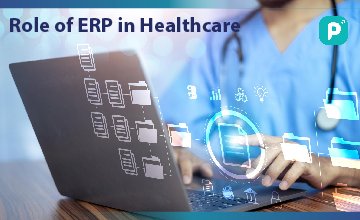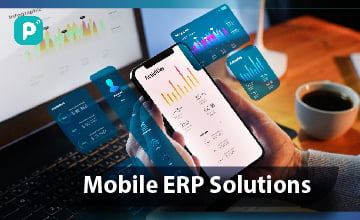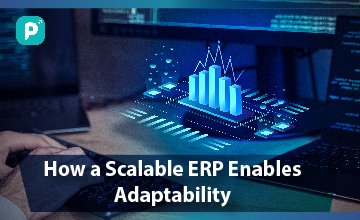Efficient and automated operations form the core of successful business practices, a principle that holds true for the healthcare industry. The adoption of cutting-edge software solutions is imperative for medical institutions and businesses alike, as it not only enhances operational efficiency but also addresses a myriad of challenges encountered in the daily operations of the healthcare sector.
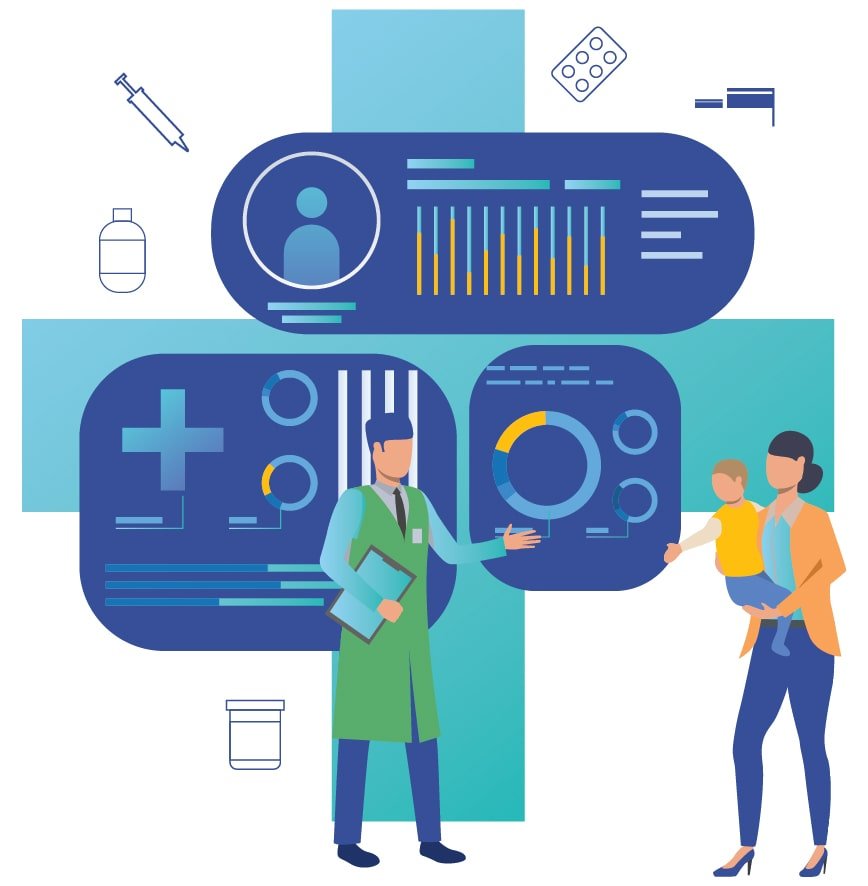
One of the prevalent challenges faced by healthcare providers is the search for effective patient and doctor management tools. These tools play a crucial role in minimizing paperwork, optimizing efficacy, and elevating patient care all while mitigating overall budgetary expenses.
Role of ERP in Healthcare
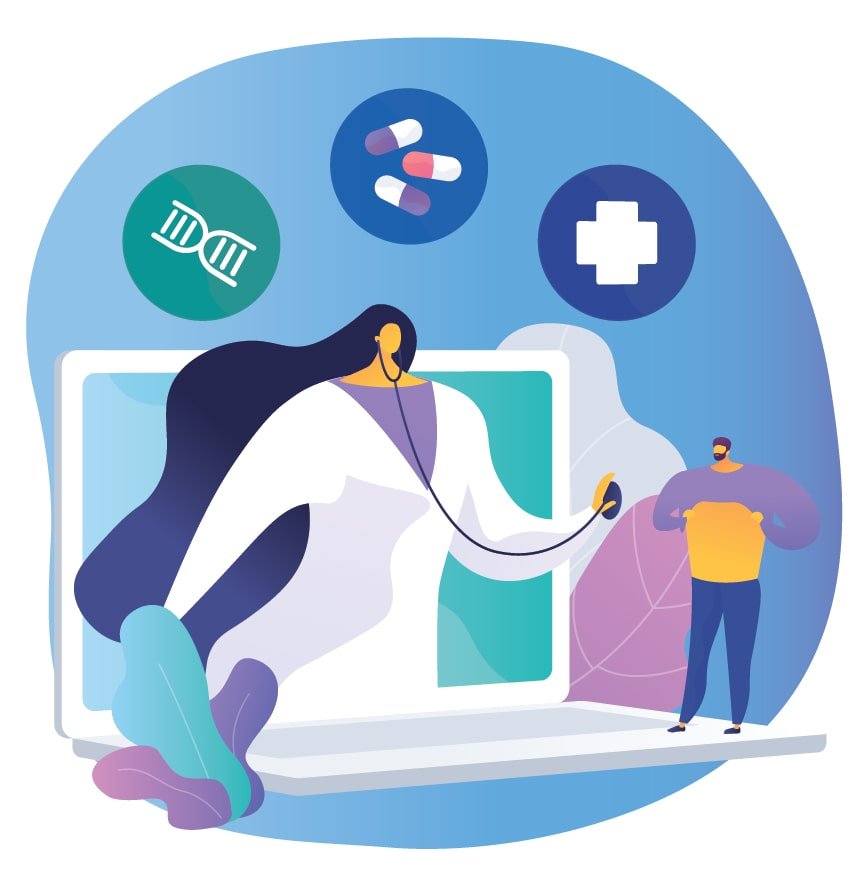
Enterprise Resource Planning (ERP) systems have become indispensable tools in the healthcare domain, revolutionizing how institutions manage both administrative processes and patient care. Here, we explore the dual impact of ERP in these crucial areas.
Streamlining Administrative Processes
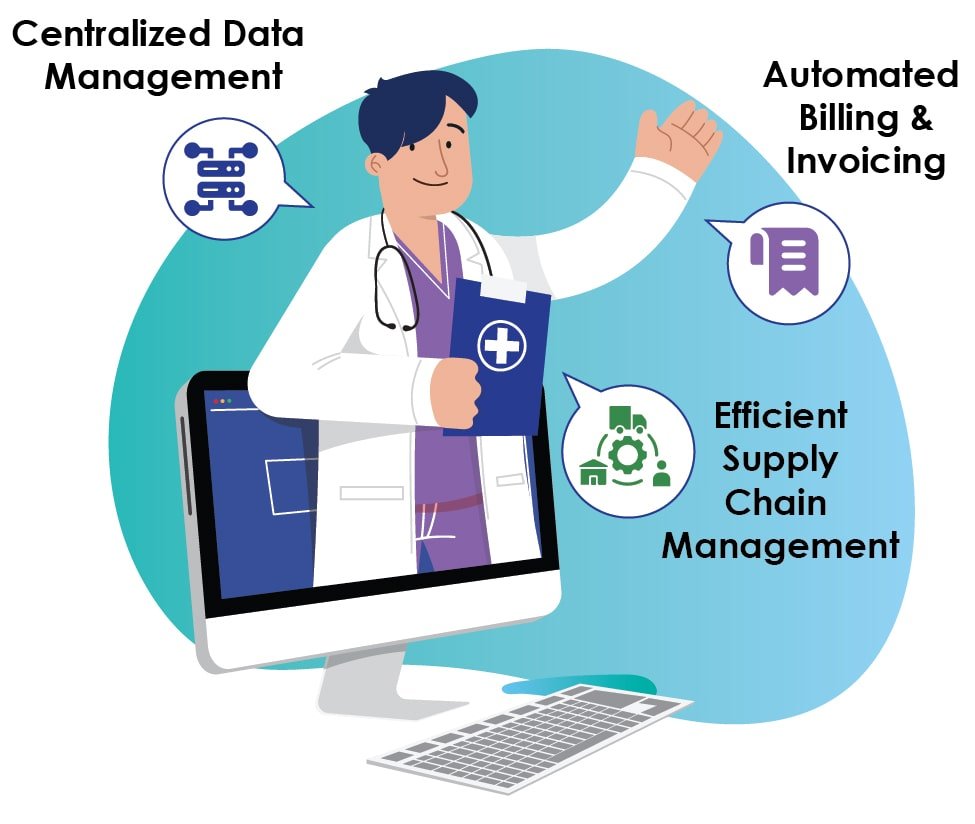
Centralized Data Management
- ERP systems act as centralized repositories, consolidating diverse data sources into a unified platform.
- Streamlining data management reduces redundancy, minimizes errors, and facilitates a more synchronized workflow.
Automated Billing and Invoicing
- ERP automation in billing and invoicing processes accelerates financial transactions and reduces manual errors.
- This feature ensures prompt and accurate billing, contributing to improved revenue cycles for healthcare organizations.
Efficient Supply Chain Management
- ERP systems optimize supply chain processes by providing real-time insights into inventory levels, procurement needs, and distribution logistics.
- Improved supply chain efficiency translates to cost savings and ensures the timely availability of essential medical resources.
Improving Patient Care
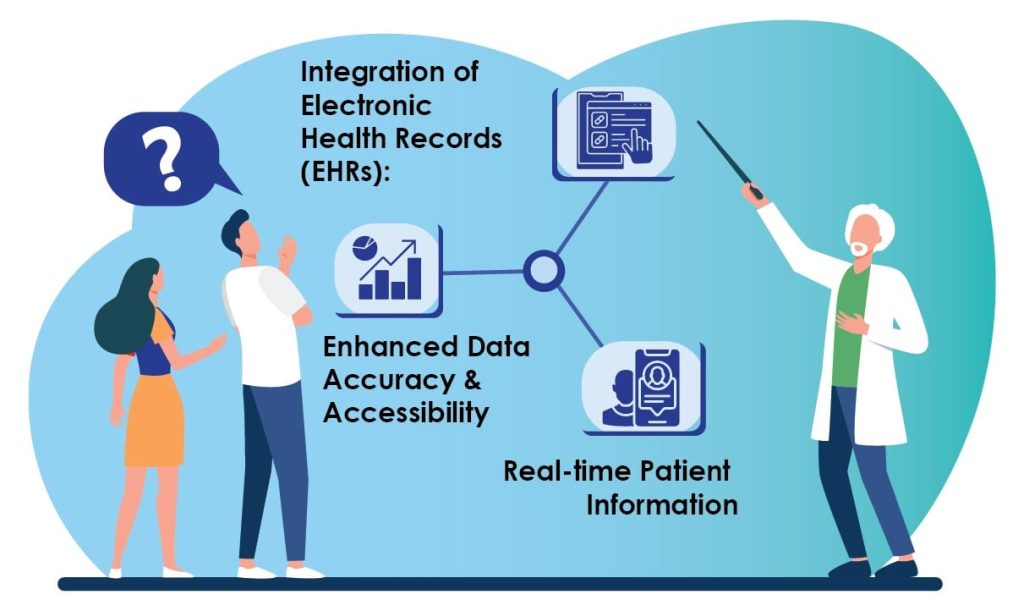
Enhanced Data Accuracy and Accessibility
- ERP systems facilitate accurate and accessible patient data by consolidating information from various departments.
- Healthcare professionals can access up-to-date patient records, promoting informed decision-making and personalized care.
Real-time Patient Information
- ERP enables real-time updates on patient conditions, treatment plans, and medication, fostering proactive and responsive healthcare delivery.
- Timely information enhances communication among healthcare providers, resulting in coordinated and efficient patient care.
Integration of Electronic Health Records (EHRs)
- ERP seamlessly integrates Electronic Health Records (EHRs), consolidating medical histories, test results, and treatment plans.
- Unified EHRs ensure continuity of care, reduce duplication of tests, and provide a comprehensive view of the patient’s health journey.
Key Features of ERP in Healthcare
Enterprise Resource Planning (ERP) systems bring a host of crucial features to the healthcare sector, addressing specific challenges and improving overall operational efficiency. Here, we delve into three key features that define the impact of ERP in healthcare.

Integration of Departments
Connecting Various Departments for Better Collaboration
- ERP fosters seamless connectivity among different departments within a healthcare organization.
- Integrated systems enable real-time data sharing, promoting collaboration and coordination among medical, administrative, and support units.
Breaking Down Silos for Improved Communication
- ERP eliminates departmental silos by providing a centralized platform for information exchange.
- Enhanced communication ensures that all stakeholders have access to accurate and up-to-date data, facilitating a more holistic approach to patient care.
Scalability and Customization
Adapting to the Specific Needs of Healthcare Organizations
- ERP systems in healthcare are designed to be flexible, allowing customization to meet the specific needs and workflows of diverse healthcare institutions.
- Tailoring the ERP framework ensures that it aligns seamlessly with the unique operational requirements of each organization.
Flexibility for Future Growth and Changes in Requirements
- Scalability is a fundamental feature of ERP, accommodating the growth and changing demands of healthcare organizations.
- As healthcare services evolve, ERP systems can scale up to handle increased data volumes, additional users, and evolving technological requirements.
Security and Compliance
Ensuring Data Privacy and Compliance with Healthcare Regulations
- ERP prioritizes data security and privacy, especially critical in the healthcare sector.
- Compliance features are integrated to meet stringent healthcare regulations, safeguarding patient information and ensuring ethical and legal practices.
Implementing Robust Cybersecurity Measures
- ERP systems in healthcare employ advanced cybersecurity protocols to protect against data breaches and unauthorized access.
- Regular updates and proactive measures ensure that the ERP framework remains resilient in the face of evolving cybersecurity threats.
Future Trends
The healthcare industry is on a dynamic trajectory of technological evolution, and Enterprise Resource Planning (ERP) systems are poised to play a pivotal role in shaping its future landscape. Here are the anticipated trends that will define the future of ERP in healthcare.
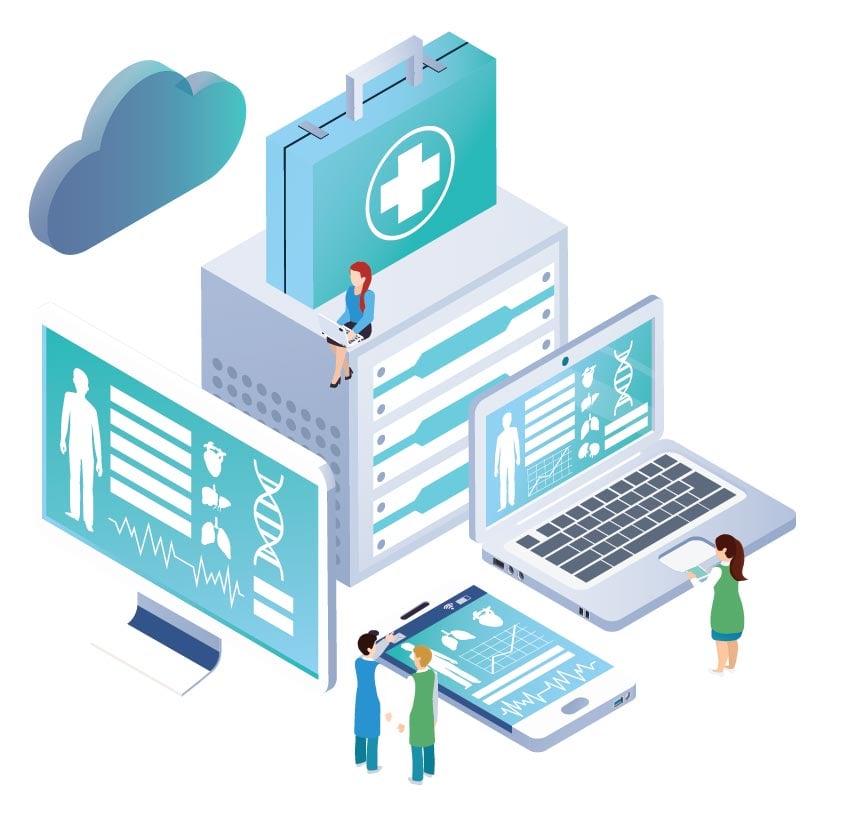
Adoption of Advanced Technologies
Artificial Intelligence (AI): Integration of AI into ERP systems will enable predictive analytics, aiding in forecasting patient needs, optimizing resource allocation, and improving decision-making processes. Internet of Things (IoT): IoT devices will be seamlessly integrated with ERP, allowing real-time monitoring of patients and medical equipment. This will enhance preventive care and streamline asset management.
Continued Focus on Interoperability
Interoperability remains a key trend as healthcare organizations strive to connect disparate systems and facilitate seamless data exchange. ERP systems will increasingly prioritize compatibility with other healthcare technologies, ensuring a cohesive and integrated healthcare ecosystem.
Cloud-Based ERP Solutions
The migration towards cloud-based ERP solutions will gain momentum, offering scalability, flexibility, and accessibility. Cloud-based ERP systems will enable healthcare institutions to manage resources and data securely while promoting collaboration and remote accessibility.
Enhanced Analytics for Informed Decision-Making
Future ERP systems in healthcare will feature advanced analytics tools that provide deeper insights into patient outcomes, operational efficiency, and financial performance. Decision-makers will rely on these analytics to make data-driven choices for improved healthcare delivery.
Personalized Healthcare Managemen
ERP systems will evolve to support more personalized healthcare services. Tailored solutions for patient care, treatment plans, and administrative workflows will become more prevalent, aligning with the trend towards patient-centric care.
Cybersecurity Measures Reinforcement
With the increasing digitization of healthcare data, ERP systems will place an even greater emphasis on cybersecurity. Advanced encryption, biometric authentication, and continuous monitoring will be integrated to safeguard patient information from evolving cyber threats.
Integration of Virtual and Augmented Reality
Virtual and augmented reality technologies will find their way into ERP systems, facilitating enhanced training for medical professionals, virtual simulations for surgical planning, and immersive experiences for healthcare education.
Focus on User Experience and Mobility
Future ERP systems will prioritize user experience, offering intuitive interfaces and mobile-friendly applications. This ensures that healthcare professionals can access critical information and perform tasks efficiently, irrespective of their location.
Emphasis on Sustainability
Sustainable practices will become a focal point in healthcare ERP systems. This includes features for eco-friendly resource management, waste reduction, and energy efficiency, aligning with the growing emphasis on sustainability in healthcare operations.
Conclusion
In the ever-evolving landscape of healthcare, Enterprise Resource Planning (ERP) systems have emerged as transformative catalysts, revolutionizing both administrative processes and patient care. The adoption of cutting-edge software solutions not only addresses the current challenges faced by healthcare providers but also sets the stage for a future defined by efficiency, collaboration, and technological advancements.
The journey through the role and key features of ERP in healthcare highlighted the profound impact these systems have on streamlining administrative processes, enhancing patient care, and fostering collaboration among diverse departments. From centralized data management to real-time patient information, ERP stands as a cornerstone in the pursuit of operational excellence and improved healthcare outcomes.
Harness the Game-Changing Potential of Digital Marketing for Your Business! Visit our website to uncover tailored solutions perfectly suited to your unique requirements, propelling your business to unprecedented success.
All images belong to their respective owners. Please email [email protected] if removal is required.

